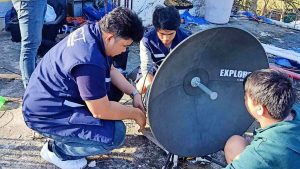THE Department of Information and Communications Technology (DICT) said it is hoping to establish up to 70,000 free WiFi sites by next year.
“Maybe we can implement between 60,000 and 70,000 sites. We will try to do that. It is important to finish the National Fiber Backbone project, which was originally scheduled to be completed by 2028 but we want to finish it by 2026,” Information and Communications Technology Secretary Henry Rhoel R. Aguda told reporters last week.
Once the National Fiber Backbone project is completed, the DICT will have more capacity to establish free WiFi sites, Mr. Aguda said, adding that the goal for the end of the year is 30,000 free sites.
In July, the government launched the second and third phases of its National Fiber Backbone project, which aims to provide high-speed internet to underserved and remote areas.
The DICT has said that it had obtained a $287.24-million loan from the World Bank to accelerate phases 4 and 5 of the project. The completion of the project is expected to spur growth in rural areas, especially in the Visayas and Mindanao.
So far, the DICT has established 19,000 free WiFi sites, Mr. Aguda said.
The DICT will be needing up to P4 billion to implement the expansion of its free WiFi sites next year, he said, noting that it can draw funding from spectrum user fees (SUF).
Spectrum user fees are collected annually from public telecommunications entities (PTEs), or those engaged in the provision of telecommunications services to the public for compensation.
“The SUF is between P6 billion and P9 billion, but we will not use it all. Maybe around P3 billion to P4 billion to cover (our target),” he said.
In March, the DICT said it will overhaul the free Wi-Fi Program to make use of low-earth orbit (LEO) satellites.
LEO satellites have the potential to increase internet capacity and reduce data transmission delays. Such satellites typically orbit at around 1,000 kilometers above the Earth. — Ashley Erika O. Jose

